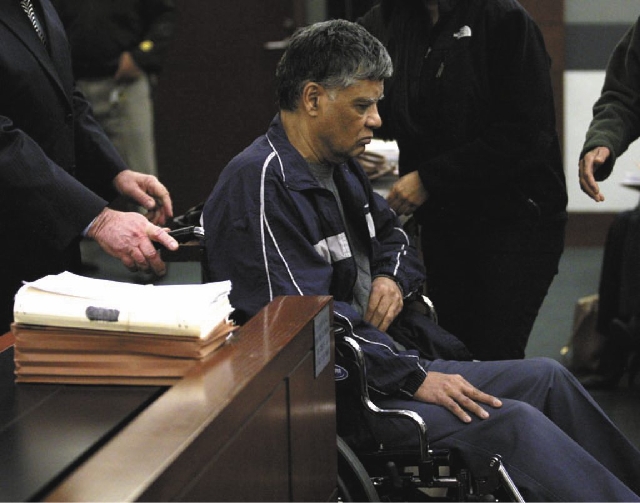Judge orders evaluation of Desai after reported stroke
District Judge Valerie Adair on Thursday ordered an independent medical evaluation of Dipak Desai to verify he had a stroke and determine the extent of brain damage.
“I am unwilling to take it at face value that he suffered a stroke,” Adair said during a court hearing.
The judge also ordered both sides to continue preparing for Desai’s April 22 criminal trial stemming from the hepatitis C outbreak.
“I don’t want to delay this trial,” she told the lawyers.
Adair met with the lawyers for about a half-hour to discuss the medical episode Desai suffered last week.
The Las Vegas Review-Journal reported Monday that the physician at the center of the 2007 hepatitis outbreak was taken by ambulance Feb. 24 to Summerlin Hospital and was treated for six days for a possible stroke.
Desai, 63, dressed in a navy jumpsuit and tennis shoes, was wheeled into court Thursday by family members. He sat motionless in the wheelchair looking downward throughout the hearing.
Adair ordered Desai to appear in court despite a request from his lead lawyer, Richard Wright, to waive his presence.
Wright provided a letter from the neurologist who treated Desai at the hospital, saying it was too soon for him to appear in court.
The neurologist, Dr. Venkat Veerappan, said in the letter that Desai suffered a “multifocal ischemic stroke within the left cerebral hemisphere.”
That caused him to be “confused” and “disoriented,” Veerappan said, adding Desai also has speech problems and “left arm and leg weakness.”
On March 1, Wright hand-delivered a letter to Adair and Chief Deputy District Attorney Mike Staudaher disclosing Desai’s hospital stay. That was the day the former gastroenterologist was released from the hospital.
Wright wrote that he visited Desai three times and that he was unable to speak “recognizable” words.
“This stroke has further exacerbated his inability to assist his defense,” Wright wrote.
“My understanding is that there is additional and severe damage to the areas of the brain controlling executive functions, including speech, memory and cognition.
“I understand that this new stroke is a symptom of a progressive and deadly condition from which he is unlikely to recover.”
But in court Thursday, Adair said she was skeptical because Desai had exaggerated his impairments from two previous strokes.
She said she wanted the independent evaluation before deciding whether to delay the trial and reinstate legal proceedings to determine Desai’s competency.
Adair also suggested Desai and his family members do a better job of following up on therapy to improve his health.
Desai and nurse anesthetist Ronald Lakeman, 65, face a series of charges, including second-degree murder, theft, insurance fraud and obtaining money under false pretenses.
Another nurse charged in the case, Keith Mathahs, 76, pleaded guilty and agreed to testify against Desai and Lakeman.
The murder charge stems from the death of Rodolfo Meana, a victim of the 2007 outbreak.
Desai performed the colonoscopy on Meana that led to his hepatitis infection, and Mathahs participated in the procedure.
Lakeman did not participate, but prosecutors contend he was culpable in Meana’s death under the theory of the murder charge, which alleges all three defendants were part of the conspiracy that endangered the lives of patients.
Health officials concluded Meana and five other patients contracted hepatitis C through unsafe injection practices on Sept. 21, 2007.
Another patient was infected on July 25, 2007.
The outbreak was blamed on nurse anesthetists reusing vials of the sedative propofol between patients after the vials had become contaminated by patients with hepatitis C.
Contact Jeff German at jgerman@reviewjournal.com or 702-380-8135.

















